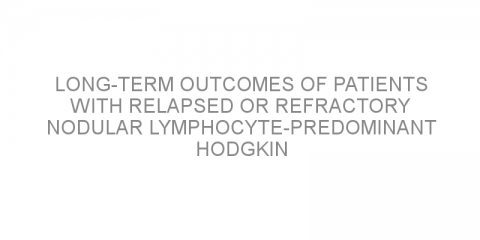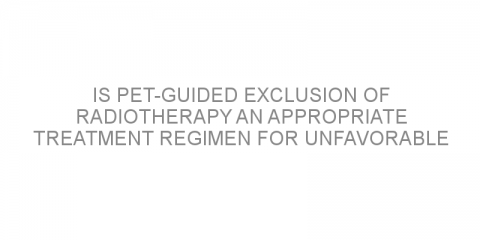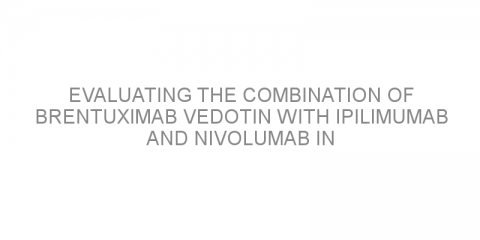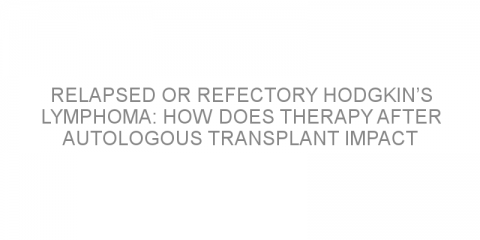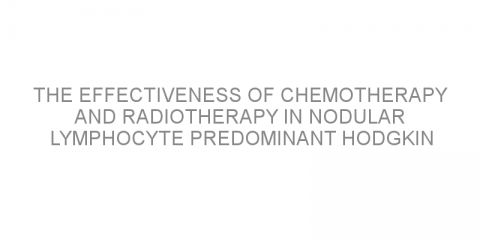In a nutshell The authors assessed the safety and efficacy of involved-field radiotherapy (IFRT) after autologous hematopoietic stem-cell transplantation (ASCT) in patients with high-risk relapsed/refractory (r/r) lymphoma. The study found that IFRT given soon after ASCT provided durable responses and was well tolerated in these patients. Some...
Read MoreHodgkin’s lymphoma Posts on Medivizor
Evaluating the effectiveness of BGD therapy in relapsed/refractory Hodgkin lymphoma
In a nutshell This study aimed to investigate the safety and effectiveness of the BGD (bendamustine, gemcitabine, and dexamethasone) regimen in patients with previously treated Hodgkin lymphoma (HL). This study concluded that BGD is well-tolerated and highly effective in these patients. Some background Hodgkin lymphoma (HL) is a cancer that...
Read MoreLong-term outcomes of patients with relapsed or refractory nodular lymphocyte-predominant Hodgkin lymphoma
In a nutshell This study aimed to evaluate the long-term outcomes of patients with relapsed or refractory (r/r) nodular lymphocyte-predominant Hodgkin lymphoma (NLPHL). The data showed that first- and second-line therapies are effective over the long-term for these patients. Some background NLPHL is an uncommon type of Hodgkin lymphoma (HL). It...
Read MoreRelapsed or refractory Hodgkin lymphoma: how does stopping and restarting nivolumab impact patient outcomes?
In a nutshell This study aimed to evaluate the safety and effectiveness of stopping and restarting nivolumab (Opdivo) in patients with relapsed or refractory (r/r) classical Hodgkin lymphoma (cHL). The authors concluded that nivolumab retreatment is well tolerated and effective in patients who achieved complete response (CR; complete...
Read MoreIs PET-guided exclusion of radiotherapy an appropriate treatment regimen for unfavorable early-stage Hodgkin lymphoma?
In a nutshell The authors investigated the impact of removing radiotherapy (RT) from treatment regimens in patients with early-stage unfavorable Hodgkin lymphoma (HL). This study concluded that this treatment regimen is just as effective as the standard of care. Some background Chemotherapy and consolidation RT is the standard of care for...
Read MoreEvaluating the effectiveness of brentuximab vedotin and AVD chemotherapy combination in high-risk patients with advanced classical Hodgkin lymphoma
In a nutshell This study compared the long-term safety and effectiveness of ABVD (doxorubicin, bleomycin, vinblastine, and dacarbazine) and brentuximab vedotin (Adcedris; A) + AVD (doxorubicin, vinblastine, and dacarbazine) chemotherapy combinations in high-risk patients with advanced classical Hodgkin lymphoma (cHL). The data showed that the A+AVD...
Read MoreEvaluating the combination of brentuximab vedotin with ipilimumab and nivolumab in relapsed/refractory Hodgkin lymphoma.
In a nutshell This study investigated the effectiveness and safety of combination regimens of brentuximab vedotin (BV; Adcetris), ipilimumab (Yervoy), and nivolumab (Opdivo) in patients with relapsed/refractory Hodgkin lymphoma (HL). The data showed that the treatment combinations had promising effectiveness and manageable side effects. Some background...
Read MoreComparing BEAM to MITO/MEL regimens before autologous hematopoietic stem cell transplantation in patients with Hodgkin lymphoma.
In a nutshell The authors compared the BEAM (BCNU, etoposide, cytarabine, and melphalan) and MITO/MEL (mitoxantrone, melphalan) regimens before autologous stem cell transplantation (ASCT) in patients with Hodgkin lymphoma (HL). The study found that both regimens were similarly effective with fewer lung side effects with MITO/MEL. Some...
Read MoreComparing the GDP and ICE regimens as salvage treatment for relapsed/refractory aggressive lymphoma
In a nutshell This study investigated the effectiveness and safety of GDP (gemcitabine, dexamethasone, and cisplatin) and ICE (ifosfamide, carboplatin, and etoposide) regimens as salvage therapy in patients with relapsed/refractory aggressive lymphoma. The data showed that both the GDP and ICE regimens are suitable options for relapsed/refractory...
Read MoreRelapsed or refectory Hodgkin’s lymphoma: how does therapy after autologous transplant impact patient outcomes?
In a nutshell This study reviewed treatment options to improve the outcomes of patients with Hodgkin’s lymphoma (HL) treated with an autologous stem cell transplant (ASCT). Some background HL is a type of blood cancer. Patients with HL who do not respond to chemotherapy are given a transplant of their own healthy stem cells. The...
Read MoreGuidelines for the management of nodular lymphocyte predominant Hodgkin lymphoma
In a nutshell This review aims to provide guidelines for the management of nodular lymphocyte-predominant Hodgkin lymphoma (NLPHL). Some background Nodular lymphocyte-predominant Hodgkin lymphoma (NLPHL) is an uncommon type of Hodgkin lymphoma (HL). It accounts for around 5% of HL cases. The outcomes are usually...
Read MoreThe effectiveness of chemotherapy and radiotherapy in nodular lymphocyte predominant Hodgkin lymphoma depending on disease stage
In a nutshell This study aimed to investigate the effectiveness of chemotherapy and radiotherapy (CRT) in patients with nodular lymphocyte-predominant Hodgkin lymphoma (NLPHL). This study concluded that combined CRT may be more effective in patients with early-stage NLPHL, particularly in older patients. Some background...
Read More


